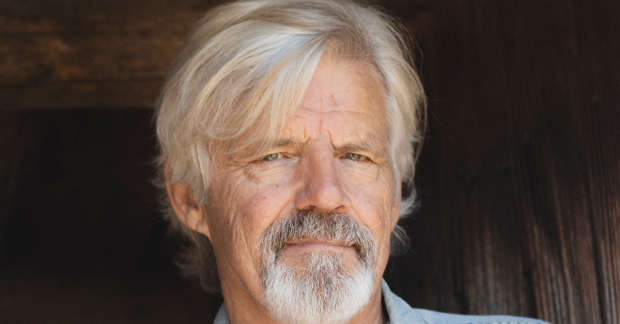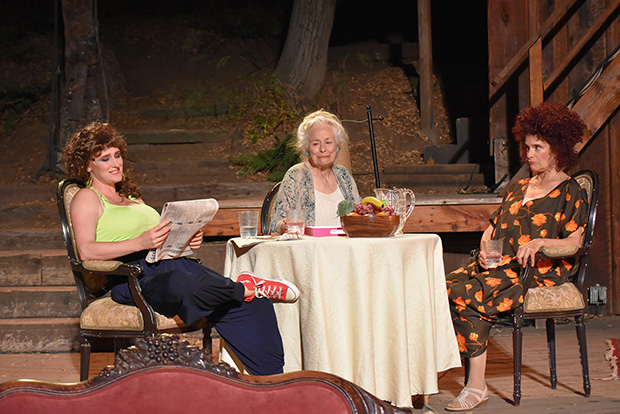Interview: On Golden Pond Playwright Ernest Thompson Talks About the Return of His West Side Waltz
Ernest Thompson will forever be best known as the author of On Golden Pond, which debuted off-Broadway in 1977, took Broadway by storm the following year, and remains best known for its 1981 film version, which earned Thompson the Academy Award for Best Adapted Screenplay.
However, it is far from Thompson's only successful work. Theatricum Botanicum is now presenting the world premiere "revisal" of Thompson's The West Side Waltz, about three single women living in 1980s Manhattan, starring veteran actor Ellen Geer, her daughter Willow Geer, and her sister, Melora Marshall. It runs through October 1 at at Will Geer's Theatricum Botanicum in Topanga, CA.
TheaterMania recently spoke to Thompson about the new version of this play, working with Katharine Hepburn, why he wrote On Golden Pond and why he wants to revive it for himself, and his first novel.

(© Bruce Luetters)
This interview has been edited for length and clarity.
Can you discuss how working with the Geer family came about?
I got contacted by Ellen; she's always looking for roles for her family. When Ellen said this play works for them – even if technically they're all too old to play these parts – I was thrilled. In theater, who cares about age? Danielle Darrieux did my plays when she was in her 90s. I saw Judith Anderson doing "Hamlet" when she was 73. With a great performer, you forget all about their age.
This production uses a revised script. What is the biggest change you made?
When it got produced on Broadway in 1981, we were just beginning to hear about AIDS; it didn't even have a name. So, I upped the play's time period to 1985 and got rid of the many gay jokes I wrote for Robin, whose ex-husband is gay. While they came off as funny back then, I wanted the script to reflect a reality that makes everything in the play more grounded. I've gotten wiser as I've gotten older and one becomes very conscious about making these things right.
Are you concerned that by keeping it in the 1980s, the play will come off as a period piece?
I think it's possibly more relevant than ever. A lot of the play reflects what it was like for some people to live through the pandemic. These women are scared of being alone in the big city. I feel for those people who didn't have a significant other during this difficult period. The play also deals with suicide and homelessness, which are very current issues. It's weird how things are so cyclical.

(© Ian Flanders)
The original Broadway production starred Katharine Hepburn. I gather you don't think that ended up being a good thing.
No, Hepburn overwhelmed the piece. We had lots of conversation about the play during the making of the film version of "On Golden Pond." And at rehearsal, she was like a kid just out of Juilliard, full of questions and excitement. She even studied with a piano teacher for eight months. Once we started performing, though, she become "Katharine Hepburn." I was not happy, but she said it was her public and she needed to please them, not me. It sold out, but now I think that money was the devil's candy.
You were 28 when you wrote "On Golden Pond." What made you want to write about the struggles of elderly people? Was it about your own family?
It's true that my dad was dying of cancer during the time I wrote the play, but that's not what the play is about. I grew up on a lake like the one in the play, and I thought I was writing about the end of an era since the area was being gentrified. And, yes, Norman was also the end of an era in his way. But it wasn't about my parents. However, after my dad passed away, my mother decided the play was about her. Once she came to LA and we went to this fancy party with all these movie stars, and I would introduce her by her actual name and she would say, "No, I'm Ethel."
You starred as Norman in a local New Hampshire production of "On Golden Pond" in 2019. Any chance you'd do it again?
I would love to do it again. In fact, I am talking about doing it with a well-known actress in a production that I would star in and direct. It's not so much that I am dying to act again, it's that I've never seen the play done exactly the way I want. Christopher Plummer in the TV film was the closest to my idea of Norman. He is supposed to be sophisticated and erudite — he was a professor of literature who regales classes with his fascinating lectures – not folksy. I also believe he thinks he shouldn't be in trouble mentally. In fact, when I did the play, my agent said I was too handsome for the part, and I said, why can't a sexy man get Alzheimer's? In fact, I think you should always believe he and Ethel are still getting it on. However, there's talk of a West Coast production with Lesley Ann Warren and Barry Bostwick, and there are at least 50 other productions this year set to go. So, I can't tie up the rights just to do my own version.
You have your first novel coming out later this year, "The Book of Maps." Tell me what prompted you to write it?
It's a story of a father and son who take a cross-country trip, and it was inspired by a trip with my son over 20 years ago. As with all my work, it's a way to express what I call my "3 Hs": heart, humor, and hope. And more importantly, "On Golden Pond" is about forgiveness; "The West Side Waltz" is about acceptance; and "The Book of Maps" is about redemption. I feel it's very moving and I hope readers will feel the same way.











